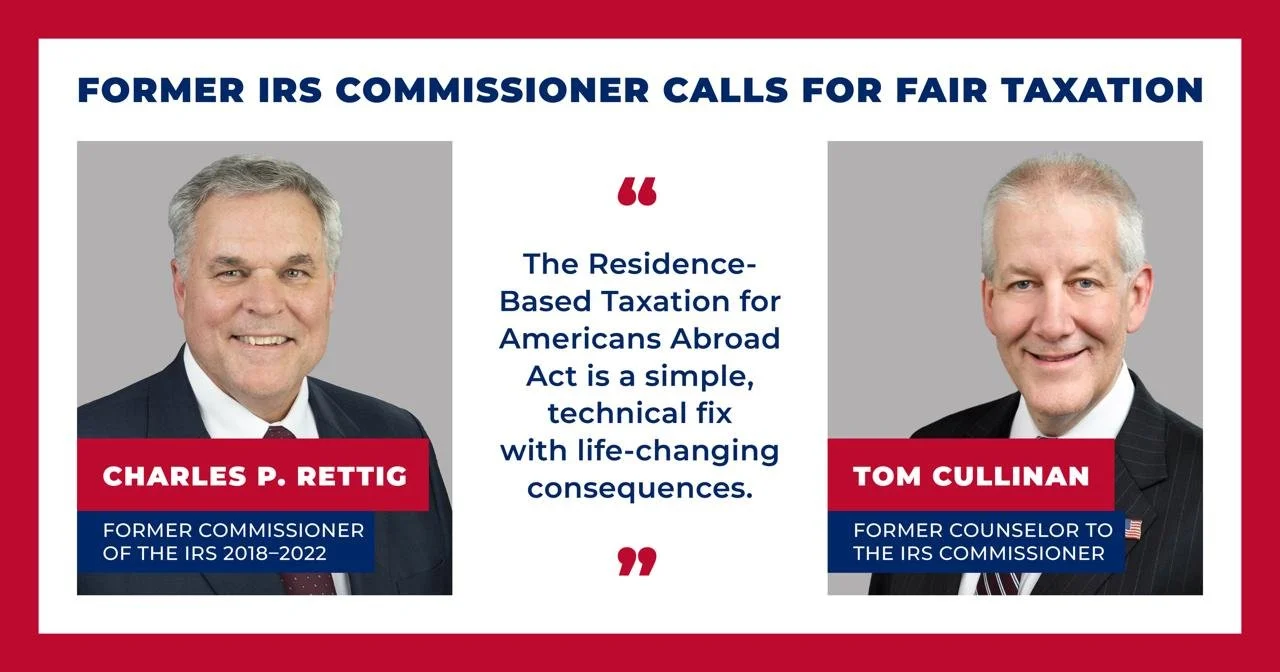Modernizing our tax system: A matter of fairness for Americans abroad
by
Charles P. Rettig, Former Commissioner of the IRS (2018–2022)
Tom Cullinan, Former Counselor to the IRS Commissioner[i]
When we joined the Internal Revenue Service, we were well aware of the scope of the mission: to guide a century old institution, made up of tens of thousands of dedicated public servants, through a period marked by budget constraints, public distrust, and digital transformation.
We are proud to have served at the IRS during the greatest public health crisis of our time. During COVID the IRS accelerated its internal gears to deliver, in record time, more than 475 million emergency payments totaling over $830 billion. IRS employees are devoted to their mission and well-understand the importance of tax fairness.
There have long been concerns of how our tax system treats United States citizens living abroad. Expansion of the digital world economy has served to exponentially increase the difficulties of U.S. citizens living abroad. The U. S. is one of the only countries in the world, along with Eritrea, that taxes its citizens based on nationality rather than residence. When it comes to fair tax treatment of citizens, does substantially every other country in the world have it right, or do we?
5 million Americans abroad
More than five million Americans who live overseas are required to file returns, report their worldwide income as well as report all their non-U.S. bank and retirement accounts, to the IRS, even if they earn no U.S.-sourced income whatsoever. They also face disproportionate penalties for mistakes, however minor or un-intentional. If questioned by the IRS, they often face tremendous difficulties communicating their positions and providing relevant information from locations outside the U.S.
Many of these individuals are entrepreneurs, teachers, artists, or salaried workers. They pay taxes where they live, just like their neighbors and colleagues. And yet, they must also file tax returns with the IRS every year. While these filings may be largely symbolic from a revenue standpoint, they carry a high personal cost in terms of anxiety, time and money, often several thousand dollars per household, year after year.
Treated fairly, U.S. citizens living abroad can be invaluable ambassadors promoting the United States throughout the world. They build bridges across borders, promote our values, and embody the promise of global citizenship. Many acquired U.S. citizenship at birth, often because they were born on U.S. soil or to a U.S. parent, but who have never otherwise lived or worked in the United States. They are not tax cheats and should not be subjected to choosing between renouncing their citizenship or a unique, highly complex tax system often requiring a search for assistance from, at best, a select few local competent tax professionals.
FATCA makes it worse
The complexity of their lives is compounded by an additional obstacle: the Foreign Account Tax Compliance Act, or FATCA. Enacted in 2010 to combat offshore tax evasion, FATCA requires foreign banks to report information about U.S. account holders to the IRS. While well-intentioned, its implementation has had deeply unfair consequences for ordinary Americans abroad.
Since the enactment of FATCA, we’ve encountered many individuals who have been mostly unable to obtain common banking services in the country of their residence, which just happens to be outside the United States. It is not uncommon for foreign banks to decline to serve U.S. citizens, fearing penalties or regulatory headaches. U.S. citizens are often unable to open a savings account, take out a mortgage, or buy life insurance in the countries where they live and work. FATCA, meant to promote transparency, has ended up creating exclusion.
Recently proposed legislation, including the “Residence-Based Taxation for Americans Abroad Act,” would allow eligible Americans living abroad to elect to be taxed solely on their U.S.-source income, just like nonresident aliens. Wealthy individuals electing into this system would remain subject to an exit tax based on the fair market value of their global assets, with thresholds aligned with existing estate and gift tax exclusions. The IRS would retain the authority to conduct targeted examinations of high-income or highly mobile taxpayers.
Life-changing consequences
The Americans Abroad Act also proposes the issuance of non-residency certificates that eligible taxpayers could present to foreign financial institutions. These certificates would exempt them from FATCA reporting requirements, allowing thousands of families to once again access basic banking services in their country of residence. It is a simple, technical fix but one with life-changing consequences.
Allowing our frontline U.S. citizen-ambassadors the opportunity to live and fairly compete with their non-U.S. citizen friends and neighbors throughout the world seems appropriate. U.S. citizenship is among the most significant benefits a parent can pass along to future generations. But, for some, the burdens that accompany that benefit may not fairly represent their overall living situation. Congress should finally consider, as a matter of some urgency to our non-resident citizens, provisions supporting residency-based taxation.
[i] Charles P. Rettig, Former Commissioner of the IRS (2018–2022), now a Shareholder at Chamberlain Hrdlicka based in Los Angeles, CA, specializes in resolving often complex tax disputes for high-wealth families and their closely held business entities as well as other business and corporate entities.
Tom Cullinan, Former Counselor to the IRS Commissioner, now a Shareholder at Chamberlain Hrdlicka based in Atlanta, GA, specializes in resolving tax disputes where he draws on both his extensive background representing taxpayers and his deep knowledge of the IRS organization, enforcement operations, and procedures.
If you are an American living abroad and also suffer from double taxation, please help us in the fight for residence-based taxation! Share your own story on our Help us page and Donate using the button below! Our campaign is 100% financed by individual donations and every donation brings us one step closer to winning!

